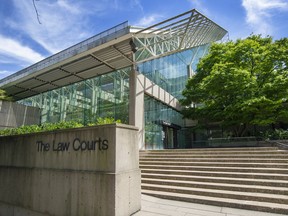ICBC now wants the B.C. Supreme Court to overturn the decision by RoadSafetyBC

ICBC is asking a court to overturn a decision that stops it from cancelling the licence of a driver until he pays ICBC the $2 million for two personal injury claims from a crash a decade ago.
The driver’s lawyers argued successfully this summer to have the licence reinstated because ICBC had six years to recover the debt and ran out of time, according to a decision by RoadSafetyBC.
Now, ICBC has asked the B.C. Supreme Court to cancel Andrew Hromyk’s licence until he pays the debt.
The driver and passenger in the Spyder settled injury claims with ICBC, the driver for $400,000 and the passenger for $1.5 million. ICBC argues that under the Motor Vehicle Act, a driver’s insurance coverage is voided if the driver is convicted of a criminal offence in a crash.
On Jan. 4 of this year, ICBC cancelled Hromyk’s licence until he paid it $1,923,913.41, the petition said.
In his appeal on Jan. 30, Hromyk admitted he was 100 per cent responsible for the crash and was convicted of dangerous driving, but did not agree he owed ICBC the money.
Hromyk also argued that even if ICBC had established that he owed the debt under the Motor Vehicle Act, “the debt is no longer enforceable” under B.C.’s Limitation Act, according to the July 29 decision by Mary Dimech, adjudication manager for RoadSafetyBC.
She concluded ICBC was subject to the Limitation Act, which says ICBC had six years to recover the debt before cancelling Hromyk’s licence on Jan. 4, 2024.
“ICBC’s decision to cancel your licence was unreasonable,” she concluded, ordering his licence returned
Hromyk’s lawyer partly relied on an ICBC letter on May 9, 2019, confirming his $5-million policy for injury claims, warning him he would be liable for anything over that limit.
“You (Hromyk) state that no debt exists because you had insurance coverage as confirmed by the coverage letter, and that if any alleged debt did exist,” and ICBC ran out of time to recover it, said the RoadSafetyBC decision.
Hromyk’s appeal argued that “ICBC cannot now try to claim it waived coverage because it has not to date withdrawn the coverage letter.”
Hromyk argued ICBC has no jurisdiction to cancel his licence without the existence of an enforceable debt.
ICBC argued that Hromyk “provided selective quotes from the coverage letter dated May 29, 2019, and there is an air of unreality to your arguments,” the RoadSafetyBC decision says.
ICBC also said it sent a number of letters to Hromyk, including a 2015 letter that said, “You may have to repay ICBC for any payments it makes for losses that are your responsibility.”
A 2016 letter states “that ICBC’s investigation indicates you are 100 per cent responsible for the accident,” and the dangerous driving conviction puts him in breach of his insurance contract, “meaning ICBC will seek to recover from you any monies paid for damages.”
But Hromyk argued the 2019 coverage confirmation letter came later and was the “last substantive correspondence” before ICBC asserted the $1.9 million claim, the decision said.
Dimech’s ruling concluded that for ICBC to meet the burden of proof, it should have demonstrated why the limitation period had not expired, “perhaps by providing an alternative timeline … which it has not done.”
But ICBC is arguing to the Supreme Court that there were two scenarios in which the six-year limitation period hadn’t expired and the adjudicator “erred in law in ignoring these possible scenarios.”
ICBC also argued RoadSafetyBC exceeded its jurisdiction.
Hromyk declined to comment. ICBC and B.C.’s attorney general both refused to comment saying they are limited during a provincial election campaign to providing only emergency, public safety or statutory information.